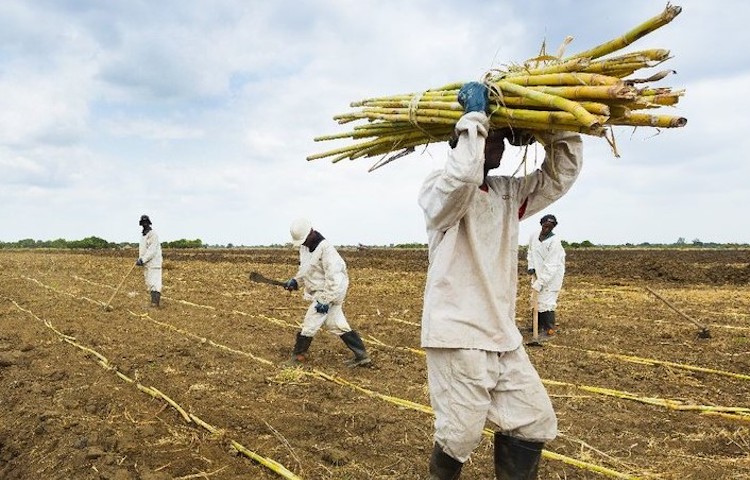By Robert Johnson
BRUSSELS (ACP-IDN) – The 79-nation ACP Group of States and the Least Developed countries (LDCs) are concerned about the free trade agreement (FTA) between the European Union (EU) and the South American trade bloc Mercosur announced on June 28, 2019. The agreement has been concluded after 20 years of negotiations.
The agreement is perceived as a thorn in the flesh of the ACP Group and LDCs, which includes 180,000 metric tonnes of tariff-free access for sugar in the under the existing 334,054 tonnes CXL quota at 98 €/t for Brazil. In other words, the first 180,000 tonnes of access would be duty-free each year, and also an additional 10,000 tonnes duty-free quota for Paraguay.
These new concessions would be in addition to the Brazil CXL quota of 78,000 tonnes at 11 €/t duty and the 289,977 tonnes CXL Erga Omnes quota at 98 €/t which mostly tends to be supplied by Mercosur countries.
The ACP Secretariat points out that prices in the EU sugar market are already very depressed, in January 2019 reaching an all-time low, suffering from the structural reforms implemented in 2017 and the combined effects of oversupply, both domestic oversupply and ever-increasing FTA (free trade area) quotas.
EU sugar prices are further depressed due to the current low world market prices which are well below the costs of production of even the lowest cost global sugar producers and are distorted by widespread and pernicious domestic subsidies, argues the ACP Secretariat.
Furthermore: The EU has traditionally been one of the most important markets for sugar from ACP and LDC countries. The ACP and LDC access to the EU market has already been severely curtailed. Additional increasing supply through new Free Trade Agreements (FTA) in an already over-supplied market can only have a detrimental effect on any residual preference afforded to developing countries.
“It is deeply regrettable that agreements such as the new EU/Mercosur agreement manifestly ignore the collateral damage done to the EU’s commitments under the Economic Partnership Agreements signed in good faith by many ACP countries,” notes the ACP Secretariat.
It adds: increased access of sugar products from countries such as Brazil whose government supports its industry, is just as unfair to traditional suppliers of the EU as is the EU’s continuing direct financial support for agricultural products such as sugar, dairy and beef.
The ACP Group comprises 48 countries from Sub-Saharan Africa, 16 from the Caribbean and 15 from the Pacific, of which 40 ACP countries are classified as “Least Developed” by UNCTAD (“LDCs”), and 37 are Small Island Developing States (“SIDS”).
Amongst the objectives of the ACP Group, is the sustainable development of its Member-States via their gradual integration into the global economy, which entails making poverty reduction a matter of priority and establishing a new, fairer, and more equitable world trading order.
The ACP Sugar Group has a very long history of supplying sugar to Europe dating back several centuries. The history of sugar and trade with the UK are closely linked and have evolved over centuries so much so that, when the UK surrendered its trade policy to the EEC in 1974, it negotiated, as part of the Accession Treaty, a Sugar Protocol. This Protocol maintained and sustained, for a list of ACP countries, a traditional trade that had existed for many years.
The EU has continued to successively reform its sugar regime and eventually renounced the Sugar Protocol with effect from 2009 and granted duty-free and quota free access to a wider group of countries. Since 2009, the EU has continued to grant additional access under new Free Trade Agreements and in October 2017 completed the reform of the sugar regime by removing domestic quotas and thus any restrictions on the amount of domestically produced sugar that can be sold in the EU.
According to www.acpsugar.org, EU sugar production has increased to more than 20.5 million tonnes making the EU a net exporter of sugar. Given that there now are no restrictions on how much tonnage can be marketed internally in the EU, the available market for ACP/LDC sugar industries in the EU has been reduced and prices in the EU are now below the equivalent price on the world market, a market that is itself heavily distorted by subsidies.
In 2013-14, ACP-LDC exports to the EU over a 12-month period were close to 2.3 million tonnes. In the period October 1, 2017 to March 31,2018, the first 6 months since the reform, they were down to just 284,000 million tonnes. [IDN-InDepthNews – 30 June 2019]
Photo source: ACP Press.
This report is part of a joint project of the Secretariat of the ACP Group of States and IDN, flagship agency of the International Press Syndicate.
facebook.com/IDN.GoingDeeper – twitter.com/InDepthNews
Send your comment: comment@indepthnews.colo.ba.be
Subscribe to IDN Newsletter: newsletter@indepthnews.colo.ba.be

